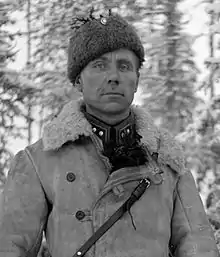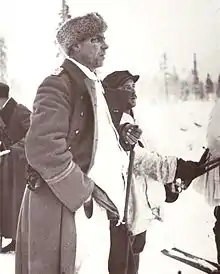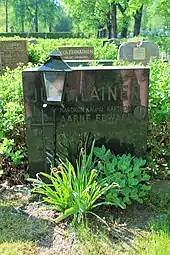Aarne Juutilainen
Aarne Edward Juutilainen (Finnish: [ˈɑːrne ˈjuːtilɑinen]; 18 October 1904 – 28 October 1976), nicknamed "The Terror of Morocco", was a Finnish army captain who served in the French Foreign Legion in Morocco between 1930 and 1935. After returning to Finland, he served in the Finnish army and became a national hero in the Battle of Kollaa during the Winter War with the Soviet Union; with his relentless fighting spirit, he rose to legendary character on the war front.[1][2] He was wounded three times during World War II.
Aarne Juutilainen | |
|---|---|
 | |
| Birth name | Aarne Edward Juutilainen |
| Nickname(s) | The Terror of Morocco |
| Born | 18 October 1904 Sortavala, Finland |
| Died | 28 October 1976 (aged 72) Helsinki, Finland |
| Allegiance | French Foreign Legion (1930–1935) Finland |
| Service/ | Army |
| Commands held | The "Moroccan company" |
| Battles/wars | Morocco Winter War (Battle of Kollaa) Continuation War Lapland War |
| Relations | Ilmari Juutilainen (brother) |
Early life
Juutilainen was born in Sortavala on 18 October 1904. His parents were railway clerk Tuomas Juutilainen and Helmi Sofia Juutilainen née Kauppinen. His brother was Ilmari Juutilainen, later better known as flying ace during the wars.[3]
Juutilainen attended school in Sortavala, where he read seven classes at Sortavala Lyceum.[4] He was athletic, who enjoyed skiing, horseback riding, fencing and Finnish baseball, the latter of which he was a member of the Sortavalan Viritys baseball team at least in 1924.[1]
Already as a young boy, he got his first contact with the war in 1918, participating in the Finnish Civil War by loading machine gun belts on the white side.[3] After the war, a still minor age Juutilainen tried to volunteer for the Aunus expedition, but the recruits found that Juutilainen had forged the consent of his parents to the expedition.[5]
Nevertheless, Juutilainen decided to choose a military career as his profession. He attended the Reserve Officer School in 1925 and continued his studies at the Cadet School in 1926–1927, but had to drop out of school due to unsuitable lifestyles for the active officer[1] and resigned from the Finnish Army in 1928.[4]
Career
French Foreign Legion
On 20 June 1930, Juutilainen travelled to France and joined the French Foreign Legion. He was transferred to Fort St. Nicolas in Southern France, near Marseille, and from there to Oran in Algeria. He spent time in a Foreign Legion training camp in the town of Sidi Bel Abbès.[5] From there he was transferred to Fez and fought in several battles against the Berber rebels in the Atlas Mountains.[5] Because of his service in Morocco, he was called "The Terror of Morocco" by Finnish troops.[5]
The war in the Atlas Mountains was long, and in 1931 the Berber offensive surrendered. Juutilainen served in the Foreign Legion for a full five years and was rewarded with the Legion Cross and French citizenship.[5] He returned to Finland on 20 June 1935, by which that time the southern part of Morocco was under French protectorate.
The Winter War

In November 1939, the Soviet Union attacked Finland, starting the Winter War. Juutilainen served in the Finnish army during this war, notably during the Battle of Kollaa.[1]
Major General Woldemar Hägglund's question "Will Kollaa hold?" ("Kestääkö Kollaa?") was famously answered by Lieutenant Juutilainen: "Kollaa will hold, unless the orders are to run." ("Kyllä kestää, ellei käsketä karkuun juoksemaan.")
During his command at Kollaa in December 1939, Juutilainen negotiated with Hägglund about the strategy for the Kollaa Front. The Battle of Kollaa was strategically important. "Unless we are told to run" meant exactly that; a week earlier, he had received a regimental order to withdraw, which he disregarded.
Afterwards, Lieutenant-Colonel and regiment commander Wilhelm Teittinen, who commanded the JR/34 at the Kollaa Front, honored Juutilainen: "He created the Kollaa Spirit". ("Hän loi Kollaan hengen")[1]
By 1940, he was a captain commanding the "Moroccan company", a unit of "good shots and good skiers" who had all been decorated for bravery. A contemporary news report described the unit as having achieved "startling victories in this sector" during the war. Juutilainen's men called him "papa". He used the guerilla warfare skills he learned with the French Foreign Legion to train his men. By this time, Juutilainen had lost one finger of his right hand as a result of Russian shrapnel.[6]
The Continuation War
During the offensive phase of the Continuation War, Juutilainen served as company commander and battalion commander in the Infantry Regiment 9.[4][1] He had the reputation of the Winter War on his shoulders and his actions were closely monitored. Juutilainen was at his best in the front line, in the middle of a fight. In Svir, he served as commander of the Battle Division of the Infantry Regiment 3.[1] The future Commander of the Defense Forces, Yrjö Keinonen, also served as one of the company's commanders in the Combat Department.[7]
After the fiercest battles of the Continuation War in Gora in 1942, Juutilainen was transferred to the command of the JR 9 garrison, a position he served in during the station wars. As a regimental commandant, he had more than a year to be promoted to 7th Division Commandant.[1] He served as the division's commandant for a year. After that, before returning to the field army, Juutilainen served from May 1944 as commander of the 31st Prisoner of War Company. The transfer to the platoon was due to "continued drunkenness and the beating of the commander in April 1944", according to the Punishment Diary of 7th Division officers; as he served as commandant of the division's headquarters, action and excitement were replaced by alcohol that was consumed in considerable quantities.[1] He was known as a nervous and ferocious man, and didn't bow to anyone, he was even known to have shot at the foot of a subordinate when he gave impetus to his orders; but in the front line, he took care of his men, was fair and respected by his subordinates.[1]
In the summer of 1944, Juutilainen once again took part in the fighting in the direction of the company in the direction of Loimola, and he was also there when the armistice was concluded and came into force at the beginning of September 1944.[8]
The Lapland War
As the captain of the Lapland War, Aarne Juutilainen took part in the early stages of monitoring the retreat of the German XX Mountain Army together with his regiment, from which the reservists had already been repatriated.[9][8] Juutilainen's battalion followed the fighting retreating Germans to Karesuvanto and still to Lätäseno until Captain Aarne Juutilainen received a notice that he would have to formally apply for resignation from the Finnish Defense Forces in December 1944.[1][8]
Death

After the war, Juutilainen struggled with peacetime, eventually turning to alcoholism.[1][9] He settled in Helsinki and supported himself with miscellaneous work.[1] Major Ahti Vuorensola, a brother-in-arms during the battle of Kolla, helped Juutilainen as much as he could. Juutilainen died alone in a nursing home in Helsinki on 28 October 1976, at the age of 72. He was buried at the Malmi Cemetery.[10]
See also
References
- YLE: Marokon Kauhu nousi legendaksi Kollaalla (in Finnish)
- Suomen Kadettiupseerit
- JUUTILAISEN VELJEKSET – HÄVITTÄJÄ-ÄSSÄ JA MAROKON KAUHU (in Finnish)
- Syrjö/Kansallisbiografia 2001 (in Finnish)
- Mäkelä, Jukka L. (1969). Marokon Kauhu [Terror of Morocco] (in Finnish). Porvoo: W. Söderström (WSOY). OCLC 3935082.
- "Russ Army Is Bombed". The Windsor Daily Star. 44 (6). Windsor, Ontario, Canada: The Star Publishing Company of Windsor. 7 March 1940. p. 18. Retrieved 8 June 2011.
- Kenraali Yrjö Keinonen – Sotaupseerit (in Finnish)
- Kapteeni Aarne Juutilainen – Sotaupseerit (in Finnish)
- "Jokainen suomalainen mies haluaisi olla Marokon kauhu": Legendaarinen sotilas voitti marokkolaiset ja venäläiset – tuomittiin suomalaisen murhayrityksestä ja kamppaili loppuelämänsä alkoholin kanssa (in Finnish)
- Halonen, Jukka: Viina vei Marokon kauhun (The Booze took the Terror of Morocco). Iltalehti, 2017, pp. 19. (in Finnish)
Bibliography
- Palolampi, Erkki (1942) [Originally published in Finland under the title Kollaa Kestää]. Der Winterfeldzug, Krieg in Finnlands Wäldern, 1939–1940 (in German). Berlin: A. Metzner. OCLC 20033401.
- Strout, Ben (director, writer); Poole, Kurt; Bowie, Michael; Lawrence, Jamie (actors) (1 February 2006). Fire and Ice: the Winter War of Finland and Russia (Television production). Indianapolis: MasterWork Media and WFYI. ASIN B000F9UEDY. Retrieved 8 June 2011.
